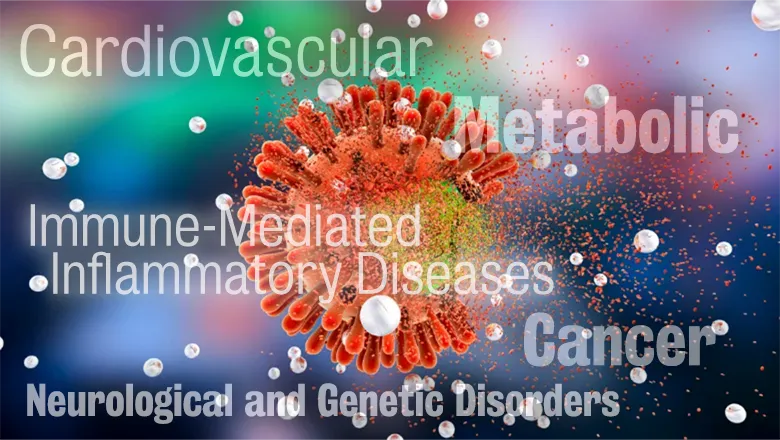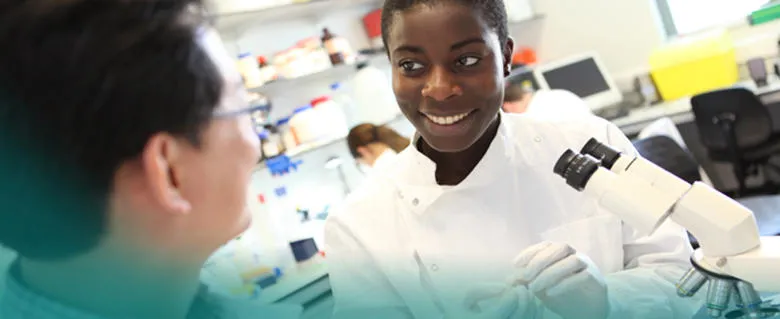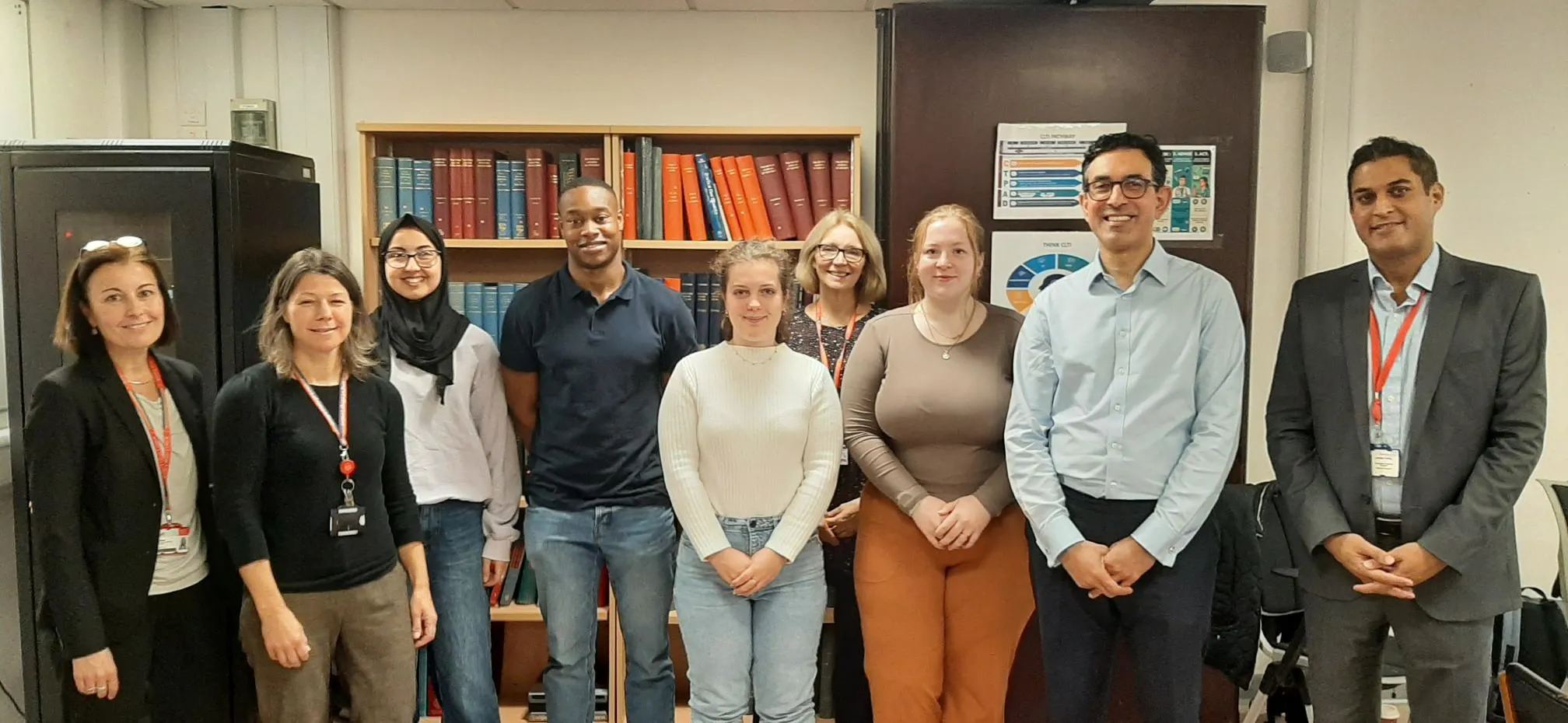About the Programme
Our multidisciplinary PhD programme aims to train the next generation of translational scientists in advanced cell and gene therapies by stimulating interactions between clinical and non-clinical scientific experts. These individuals will become future key opinion leaders, innovators and entrepreneurs in the field of Advanced Therapies.
King’s is a world leader in the field of Advanced Therapies with this area one of its key pillars and unique strengths. King’s hosts our dedicated Gene Therapy Innovation Hub that complements an Advanced Therapies Accelerator for pre-clinical development.
The programme is developed around six main clinical focus areas: Cardiovascular, Metabolic, Immune-Mediated Inflammatory Diseases, Cancer, Neurological and Genetic Disorders. It also incorporates cross-cutting disciplines such as health data science, artificial intelligence, imaging and bioengineering.

Training
We use a combination of regular in-person interactions and blended learning to maximise the training and mentorship resources available. Every student will attend Fundamental Research Training to deepen their knowledge of Advanced Therapies and take part in a Bespoke Training Programme tailored to their interests and career aspirations. During the PhD, successful applicants will be able to interact with our Industry Partners through masterclasses, visits and placement options. Furthermore, students will be embedded in the UK Advanced Therapy Network. In addition, we have partnered with University College London and the University of Manchester to allow our students access to bespoke courses in Advanced Therapies offered by these two institutions.
Leadership & Supervisors
The Programme is Directed by Professor Bijan Modarai.
The Leadership Team consists of:
We have a diverse, enthusiastic, intergenerational group of 88 basic scientists and clinical supervisors engaging the breadth of expertise at King's relevant to advance therapies.
Our supervisors support a positive and inclusive research culture, have zero tolerance for bullying and harassment, and are committed to fairness. See the complete list of supervisors in the link in the right hand column.

Students will access King's world-class resources
Students enrolled in this Programme will join a vibrant research environment, and will interact with fellows from the Wellcome Trust PhD Programme in Advanced Therapies for Regenerative Medicine, MRC Doctoral training Programme, BHF Centre and UK Dementia Research Institute.
Students will join King's College London and have access to a vast range of resources, including:
- State-of-the-art laboratories and access to cutting-edge equipment supporting genetics, molecular and cellular biology, induced pluripotent stem cells, animal models of disease, high-throughput screening and high content imaging, multimodality in vivo imaging, proteomics, integrative physiology and viral & non-viral vector production.
- Expertise in data science, including computer science and AI, bio- and clinical informatics, and statistics.
- Facilities at the MRC/LifeArc funded Gene Therapy Innovation Hub and Research England-funded Advanced Therapies Accelerator for pre-clinical development.
- King's Health Partners (KHP) is an Academic Health Science Centre where world-class research, education and clinical practice are brought together for the benefit of patients. KHP comprises King's College London and three of London's largest hospital trusts, Guy's and St Thomas' NHS Foundation Trust and King's College Hospital NHS Foundation Trust.
 L-R Professor Bijan Modarai, Back row: Lizzie Hogben, Lara Ibrahim, Varinder Kaur, Professor Georgina Ellison-Hughes, Sarah Double. Front row: Sara Nakanishi, Dinethri Patel, Professor Elizabeth Bradbury, Dr Rocio Sancho.
L-R Professor Bijan Modarai, Back row: Lizzie Hogben, Lara Ibrahim, Varinder Kaur, Professor Georgina Ellison-Hughes, Sarah Double. Front row: Sara Nakanishi, Dinethri Patel, Professor Elizabeth Bradbury, Dr Rocio Sancho.
2025 Cohort and Projects
Lizzie Hogben
"Impact of Extra-cellular and Soluble Chimeric Antigen Receptors (CAR) on Efficacy and Toxicity of CAR T cell therapy"
Supervisors Graham and Schurich
Lara Ibrahim
"Revealing the molecular pathophysiology of novel laminopathy variants from human heart failure patients using tissue engineering and light-sheet imaging"
Supervisors Stroud and Bastiaenen
Varinder Kaur
"Exploring inflammatory mechanisms in chronic heart failure: Identification of biomarkers and therapeutic targets"
Supervisors Bromage and Quek
Sara Nakanishi
"Identification of Novel Treg Targets in Patients with Crohn's Disease (CD) and Ulcerative Colitis (UC) Using Spatial Transcriptomics as Part of the TRIBUTE Trial"
Supervisors Lord and Irving
Dinethri Patel
"Investigating human B cells and their expressed antibodies in cancer to evaluate antigen reactivity"
Supervisors Karagiannis, Tull and Tsoka
I applied for the Translational Research in Advanced Cell & Gene Therapies PhD Programme as I find this research area fascinating and wanted to continue my studies following completion of an MSc in this field. In my first year, I have further developed my research skills and have become more confident and independent through day-to-day lab work as well as workshops and skills training. Being based at KCL has given me access to resources such as the Stem Cell Hotel and Advanced Cytometry Platform, and being part of the Programme has allowed access to other MRC DTP resources.– Victoria Richardson
 Left to right - Dr Rocio Sancho, Professor Elizabeth Bradbury, Zahra Shather, Uchenna Okpechi, Leah Wynn, Sarah Double, Sara Morales Carnicero, Professor Bijan Modarai, Dr Ashish Patel
Left to right - Dr Rocio Sancho, Professor Elizabeth Bradbury, Zahra Shather, Uchenna Okpechi, Leah Wynn, Sarah Double, Sara Morales Carnicero, Professor Bijan Modarai, Dr Ashish Patel
2024 Cohort and Projects
Sinead McCabe
“Parasite-infected red blood cells as a novel cell-based advanced nanomedicine delivery system”
Supervisors Najer and Bergholt
Sara Morales Carnicero
“RNA therapies for cardiac regeneration”
Supervisors Giacca and Mano
Uchenna Okpechi
“Modulation of inflamm-aging in ischaemic disease using mesenchymal stem cells and senolytics”
Supervisors Patel and Ellison-Hughes
Zahra Shather
“Protrudin and Partners: Developing Advanced Regenerative Gene Therapies for Treating Spinal Cord and Brain Injuries”
Supervisors Bradbury and Eva
Leah Wynn
“Investigating determinants of response to chimeric antigen receptor T cells (CAR T cells) in multiple myeloma (MM) and developing MM-targeted base edited universal CAR T cells”
Supervisors Benjamin and Napolitani
My fascination with the brain and central nervous system diseases inspired me to pursue a PhD, and choosing the programme in Advanced Cell and Gene Therapies allowed me to develop both scientifically and personally in an interdisciplinary and stimulating environment, collaborating with academic and industry partners. My project focuses on understanding the molecular mechanisms behind axonal degeneration in ALS by combining bioengineering and iPSC technology. Through the programme, I've had the chance to conduct cutting-edge research, meet patients, teach, attend conferences and broaden my knowledge across various fields.– Sofia Fredin
 Left to right - Sofia Marina Konstantinidou, Drenusha Sejdiu, Victoria Richardson, Emma Salmela, Yan Lau, Sofia Fredin
Left to right - Sofia Marina Konstantinidou, Drenusha Sejdiu, Victoria Richardson, Emma Salmela, Yan Lau, Sofia Fredin
2023 Cohort and Projects
Thomas Dolphin
“Optimising adeno associated virus (AAV) gene therapy vector production through the study of component production assembly and virion excretion mechanisms”
Supervisors Ali and Pearson.
Sofia Fredin
“Investigating the links between axonal degeneration mechanisms and early pathological phenotypes in Amyotrophic Lateral Sclerosis using a bioengineered human stem cell platform”
Supervisors Serio and Sreedharan.
Sofia Marina Konstantinidou
“Pre-clinical development of a modified U7 small nuclear ribonucleoprotein to target sense and antisense repeat expansions in C9ORF72-ALS/FTD”
Supervisors Ruepp and Mizielinska.
Yan Lau
“Antigen Processing and Presentation in Cancers”
Supervisors Irshad and Josephs.
Victoria Richardson
“Human induced pluripotent stem cell-derived Genome Engineered Macrophages (GEMS) as novel cell therapy agents”
Supervisors Mukhopadhyay and Dasgupta.
Emma Salmela
“Exploration of drug-inducible riboswitches to regulate AAV-delivered transgene expression”
Supervisors Shaw and Ruepp.
Drenusha Sejdiu
“Transcriptional signature of replicating cardiomyocytes during cardiac regeneration”
Supervisors Giacca and Mano.
Application
Applications for this programme are currently closed.
Applying to this programme is a two-stage process.
Stage One consists of completing an online application form to inform us of your qualifications and relevant experience, your motivation for applying and your future career plans.
The applications will be reviewed, and successful candidates will be invited to panel interviews in Stage Two. Applicants who are offered an interview will be invited to submit an application via King’s Apply where final checks on academic qualifications, English language requirements and fee status will be made. Completing this process is required for applicants to be awarded a studentship.
Please direct all programme enquires to SCMMS-PGR@kcl.ac.uk
Eligibility
The programme welcomes applications from a diverse range of backgrounds. Applicants will be reviewed on qualifications, experience and potential to undertake a research degree.